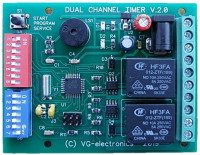Two-channel programmable timer


Timer on a microcontroller without LED and LCD indication
The timer is designed to count time intervals and has two independent channels.
It can operate in a cyclic-continuous mode (an infinitely repeating on-pause cycle), in a cyclically-limited mode (a predetermined number of on-pause cycles) or in a single-on mode (a predetermined on-time).
The timer has four operating states: initial, time countdown mode, programming mode and service mode. Different timer states can be selected using a single button by varying the time it is pressed.
Modes of operation, channels, intervals and time slice are set using the on-off DIP switches. The absence of 7-segment LED and LCD indicators makes the design cheaper.
In the mode of counting time, the countdown is made in the mode of single switching on, in cyclically-limited or cyclically-continuous mode. After the countdown, the timer returns to its original state.
In programming mode, you can set the on time, off time, the number of on-off cycles and the time slice for each channel. A time quantum (second, minute or hour) is set in the range from 1 to 99 and can be selected independently for each channel.
Thus, the minimum possible time interval in each channel can be equal to 1 second, the maximum - 99 hours. The number of duty cycles can range from 1 to 99. All programmed constants are stored in the non-volatile memory of the EEPROM of the microcontroller.
In the service mode, you can see how many times the relay of the first channel was turned on during cyclic-limited mode in the previous cycle of operation.
The timer has a light and sound indication, illustrating the various modes of its operation. Sound indication allows to avoid programming errors in case of incorrect setting of DIP-switches.
The timer is based on the ATMega8A microcontroller (TQPF-48), in the AVR-Studio environment, in CAD DipTrace. The timer can be powered by a 12 V DC adapter or battery.
.



Discussion (0 comments)